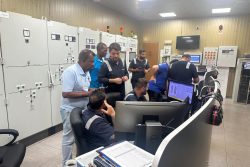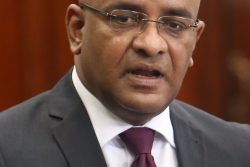Dear Editor,
Mr Granger took office with a lot of promise. He will leave office at some point with the stain and stench of this election inextricably attached to his legacy. His attempt to distance himself from what transpired since the election does not pass the smell test. His singular goal is and has always been to hang on to power. That was evident from the things he did prior to the election and remains so today.
The current post election controversy was foreseeable. The actions of his cohorts since the election are consistent with Mr Granger’s own actions before the election dating back to December 2018 when he lost the No Confidence vote. During that time he demonstrated very clearly that he would go to great lengths to hang on to power. Undisguised shaming by the Caribbean Court of Justice had no effect on his conduct. To quote the learned Justices:
“One does not have to study law to appreciate that the word `majority’ means the greater of two parts.”
That stirring rebuke was followed by another disdainful criticism by the court:
“Such a majority is clearly at least 33 votes. On the 21 December 2018 we would venture to suggest that every member of the Assembly knew this. The Clerk certainly knew it. And so too did the Speaker who announced that the motion had passed.”
It was obvious to the court that Mr Granger was gaming the system. His response to the No Confidence vote was a precursor to everything that transpired since the election. His supporters now admit that asking the CCJ to solve a simple math problem, served the desired goal of holding on to power for another year. In a civilised society, decent law abiding citizens are expected to obey orders of the court. Mr Granger is not above the law but he flagrantly ignored the order of the CCJ to hold elections within three months and kept himself in office for another nine months.
Mr Granger’s fight to install a surrogate as head of Gecom, when viewed through the lens of what happened since the election, looks like an attempt to get all his ducks in a row in anticipation of the Mingo plan. A supportive Chairman, a conflicted CEO and three faithful commissioners doing his bidding would have given Mr Granger all the resources he needed to implement the Mingo plan and remain in office. When the CCJ rejected his attempt to subvert the process, he may have thought he found someone who would be ineffective in that role. Time will tell.
Because he did all of that before the election, the Mingo episode and everything else that happened after the election should not have been a huge surprise. Mingo was not some rogue element who conjured up a weird plan. He plotted with others to execute a predetermined plan to distort the results to keep Mr Granger and his cohorts in power. It may have worked but for the diligence of the independent observers and outrage from the international community.
The problem facing Mr Granger and his cohorts is that they were confident the Mingo scheme would succeed. As a result, they did not have an exit strategy or a plan B. When Mingo’s plan imploded they started looking desperately for a life raft. A lawsuit by an APNU candidate represented by another APNU candidate was brought before a judge and supported by the author of the 156-day recount proposal. Neither the lawsuit nor the recount proposal warranted serious consideration and were disposed of accordingly. Other actions like the untimely fumigation of the court house, the Arthur Chung Convention Centre and the Gecom office disrupted important events related to the election results and raised questions of propriety. Coincidence maybe, but so too was Mingo’s illness.
The time they bought allowed Mr Granger’s supporters to launch as distraction campaign similar to one used by the tobacco industry many years ago. Issues like race and power sharing were raised and over time they have gone from no recount to a full recount in numerical sequence and eventually to a forensic audit of sorts with no real explanation. The big question now is how does this end. The decision by APNU+AFC to hire a US lobbying firm to refurbish their tarnished image is evidence that they are bracing for the long haul. Does anyone believe Mr Granger was not involved in that decision and post-election strategy in general?
This history informs us of what lies ahead. Apart from the delay strategy which was obvious all along, the rest of the plan is unclear. So too is the end game. Among the questions begging for answers are: When will the recount start? Will there be further delays or disruption? Will the results be conclusive? Will there be attempts to muddy the water? Will the results be accepted by all concerned?? Will the Prime Minister and the Health Ministry hinder the recount?
Last but not least, is there any circumstance where Mr Granger and his party will accept a result that is unfavourable to them and exit gracefully?
Yours faithfully,
Milton Jagannath





